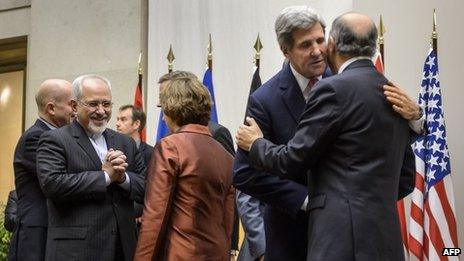Iran nuclear deal: Key points
- Published

World powers and Iran have begun implementing a deal on Iran's nuclear programme following intense talks in Geneva.
Both sides committed to a series of steps which will last for six months, while a more conclusive deal is negotiated.
Here are the key points of what the US says the two sides agreed:
What Iran will do
- Halt production of near-20% enriched uranium and disable the configuration of the centrifuge cascades used to produce it
- Start to dilute half of the near-20% enriched uranium stockpile that is in hexafluoride form, and continue to convert the rest to oxide form not suitable for further enrichment
- Not enrich uranium in roughly half of the installed centrifuges at Natanz facility and three-quarters of the installed centrifuges at Fordo (Read our guide to Iran's nuclear facilities)
- Limit its centrifuge production to those needed to replace damaged machines
- Not construct additional enrichment facilities
- Not go beyond its current enrichment research and development practices
- Not commission or fuel the Arak heavy-water reactor
- Halt the production and additional testing of fuel for the Arak reactor
- Not install any additional reactor components at Arak
- Not transfer fuel and heavy water to the Arak reactor site
- Not construct a facility capable of reprocessing at Arak, preventing the separation of plutonium from spent fuel
- Agree to a cap on the permitted size of Iran's up-to-5% enriched uranium stockpile
- Allow IAEA inspectors to visit the Natanz and Fordo enrichment sites daily and the Arak reactor at least monthly
- Provide "limited, temporary, targeted, and reversible [sanctions] relief". (See Q&A: Sanctions)
- Not impose further nuclear-related sanctions if Iran meets its commitments
- Transfer $4.2bn (£2.6bn) of oil revenue to Iran in instalments
- Suspend the implementation of sanctions on Iran's petrochemical exports and its imports of goods and services for its automotive manufacturing sector
- Pause efforts to further reduce purchases of crude oil from Iran by the six economies still purchasing oil from Iran
- Suspend sanctions on Iran's imports and exports of gold and other precious metals
- License the supply of spare parts and services for the safety of flight of Iran's civil aviation sector
- Facilitate the establishment of a financial channel to support humanitarian trade already permitted with Iran and facilitate payments for UN obligations and tuition payments for students studying abroad
- Modify the thresholds for EU internal procedures for the authorization of financial transactions